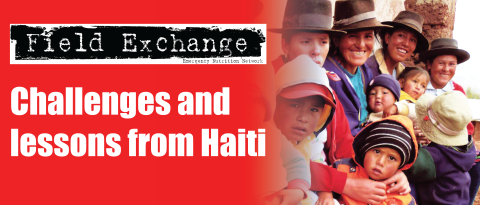All in Diary – a practical resource for those working in emergencies
The All In Diary is a web-based resource - with country-specific print versions - for field-based humanitarian workers, particularly those working in disaster situations. It is produced by the UK registered charity of the same name. The idea originated in 2006 in Sri Lanka, and it has been piloted in many countries since, most recently a country- specific version in Zimbabwe.
The All in Diary comprises three interrelated tools:
Website: Over 50 up-to-date information pages on key humanitarian topics related to Principles of Humanitarian Practice, Disaster Preparedness, Managing People and Projects and Working with Communities, plus over 200 recommended resources. These are regularly updated, and available in 7 languages.
Diary: An A5, spiral bound paper-based diary which integrates the information pages available here, with diary and notes pages: printed and distributed in-country in response to a specific emergency and a generic version available to download.
CD: Includes the information pages, plus the full-range of recommended resources: available and distributed in conjunction with the print edition diary.
In September 2009, an 'All In Diary Zimbabwe' was produced, in collaboration with RedR and funded by ECHO. Reasons for its development included the significant limitation in access to information about humanitarian principles and practice among local organisations, government and affected communities in Zimbabwe and the limitations in access to web-based information. Two thousand print diaries (key information pages and diary/note space) were distributed to 145 humanitarian organisations and 41 government departments or district offices together with 50 CDs. Both included Zimbabwe specific content.
Feedback from an external evaluation of a cross-section of users in March 2010 endorsed the value, relevance and utility of the Zimbabwe All In Diary in supporting their work. For example, it has been instrumental in enhancing personal management through improved planning, record keeping and reporting. It was noted as especially useful for sector specialists, in understanding more about other aspects of humanitarian action about which they often have little or no knowledge. Recommendations for future in-country versions include consideration of: how to improve targeting and distribution (including how to target less well resourced organisations and involve relevant government ministries more efficiently), materials design, content (contextualised and the importance of updates), and resource CD role.
Visit the All in Diary at www.allindiary.org
The full Zimbabwe evaluation report is available on request from info@allindiary.org
Imported from FEX website


